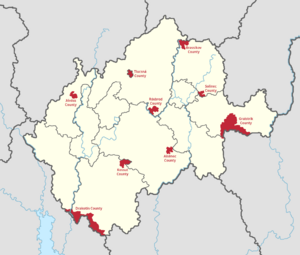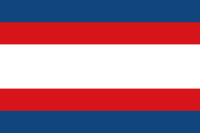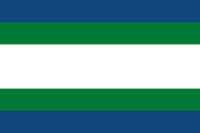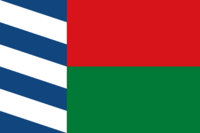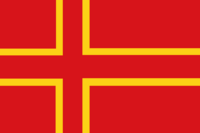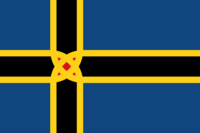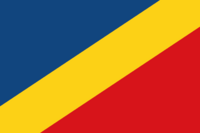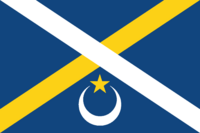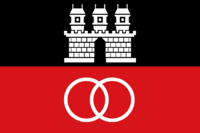Special Counties in Walneria: Difference between revisions
m (→List) |
m (→List) |
||
| Line 27: | Line 27: | ||
===List=== | ===List=== | ||
{| class="wikitable sortable mw-collapsible mw-collapsed" style="text-align: center;" | {| class="wikitable sortable <!--mw-collapsible mw-collapsed-->" style="text-align: center;" | ||
!colspan=3|Name !!rowspan=2 class=unsortable|Flag !!rowspan=2|Municipalities !!rowspan=2|Population !!colspan=2|Date !!rowspan=2 class=unsortable|Map | !colspan=3|Name !!rowspan=2 class=unsortable|Flag !!rowspan=2|Municipalities !!rowspan=2|Population !!colspan=2|Date !!rowspan=2 class=unsortable|Map | ||
|- | |- | ||
Revision as of 10:21, 3 August 2022
This article is incomplete because it is pending further input from participants, or it is a work-in-progress by one author. Please comment on this article's talk page to share your input, comments and questions. Note: To contribute to this article, you may need to seek help from the author(s) of this page. |
The Special Counties in Walneria (Walnerian: Specialí Krese Rósberlandes), also known as the Experimental Counties (Walnerian: Experimentalí Krese) are groupings of municipalities in the Confederacy of Walneria, usually between 10 and 20 in number, that either implore a political or an economic system, that the Government of Walneria hopes to test on a smaller scale before eventually adopting it national-wide or region-wide, to see what needs to be changed and what exactly can be expected from it, or they are used to represent local minorities, that are too localized to be given their own region.
Implementation
TBA
Establishment
A Special County can be established only via a local referendum, where at least 50% of the returned votes in at least 75% of the municipalities are in favor, while at least 55% of total votes are in favor. This referendum includes the question formatted as:
- „Do you willingly support the establishment of the [location] Special County in [your municipality], that uses the [system of governance] as defined via the proposal [number/year] SNVG ‚Establishment of the [location] Special County‘ in exchange for the benefits listed in §5-12 in the law 115/1999 SNVG ‚On the establishment of Special Counties‘?“
This wording has been defined in the said law 115/1999 SNVG, in §13.
Benefits
There is a set of 8 benefits for people living a Special County, that serves to compensate for the nature and risk of a system established and serves as an intention for citizens to participate in the local experiment:
- §5 - Lowering of the property tax to 90% of the original value as defined by law
- §6 - Monetary compensation equal to 100Ԟ in exchange for particiaption in the polling stations and local election[a]
- §7 - Two more paid time off days per year[b]
- §8 - Monetary support for long-time residence in the Special County, that starts paying after the county exists for 15 years and more
- §9 - Increase of monetary support to cultural actions to 110% of the original value as defined by law
- §10 - Partial reimbursement for utilities (water, electricity, gas & trash removal), spanning between 5% and 10%
- §11 - Enforcing that public offices (town hall, construction offices...) are open on Friday as well[c]
- §12 - One-time 2 month deadline extension for tax return forms[d]
- ↑ Applies only on special voting and polling, not regular elections, for example to the National Assembly
- ↑ It is implied that at least once a year a poll is carried out on polling stations to find out how the system works for the citizen
- ↑ It is required by law, that public offices are open to public on Monday and Wednesday. Many offices open to public on Friday as well on their own discression, but in Special Counties, due to the added strain to the administrative, public has the right to go to an office on Friday as well
- ↑ It is implied that the system may change some taxation regulations, so to make the transition easier, tax returns for the first year are delayed to allow for an adjustment period
Risks
TBA
List
| Name | Flag | Municipalities | Population | Date | Map | |||
|---|---|---|---|---|---|---|---|---|
| Anglish | Walnerian | Other official | Established | Disestablished | ||||
| Graistrik Special County | Graistrikŕ Speciale Kres | Patädagrafän Grastränik (Stedorian) |  |
35 (Starbov Region) 1 (Olmón Region) |
~27,500 | 1 January 2001 | — | 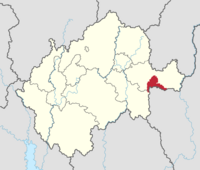
|
| Drakotín Special County | Drakotínŕ Speciale Kres | Drakotínský Zvláštní okres (Ustokan) Drakotniski Wosebity wokrjes (Upper Malenik) Drakotniski Wósebne wobceŕk (Lower Malenik) |
 |
31 (Ŕezënfeld Region) 2 (Égënáŕ Region) |
~19,300 | 1 January 2001 | — | 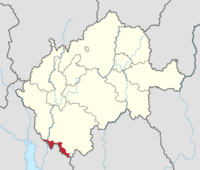
|
| Tlucsná Special County | Tlucsnáŕ Speciale Kres | Tlucsenski Wósebne wobceŕk (Lower Malenik) |  |
5 (Malenik Settlement Area) | ~4,900 | 1 January 2001 | — | 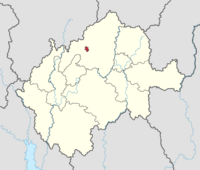
|
| Panholcsice Special County | Panholcsicŕ Speciale Kres | Panholčický Zvláštní okres (Ustokan) |  |
4 (Ustokan Settlement Area) | ~4,100 | 1 January 2006 | 22 November 2009 | 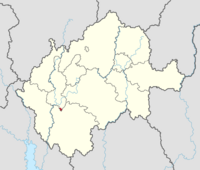
|
| Solinec Special County | Solincŕ Speciale Kres | — |  |
17 (Cízaren Region) | ~13,100 | 1 January 2009 | — | 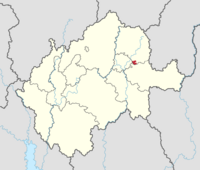
|
| Kossut Special County | Kossutŕ Speciale Kres | — |  |
12 (Ŕezënfeld Region) | ~12,300 | 1 January 2009 | — | 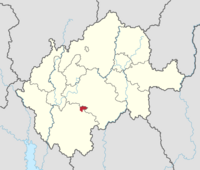
|
| Vëpokoinë Special County | Vëpokoiniss Speciale Kres | Wpokojenski Wosebity wokrjes (Upper Malenik) |  |
5 (Malenik Settlement Area) | ~2,300 | 1 January 2001 | — | 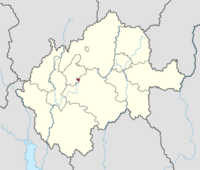
|
| Aisënec Special County | Aisëncŕ Speciale Kres | — |  |
13 (Lómane Region) | ~12,900 | 1 January 2010 | — | 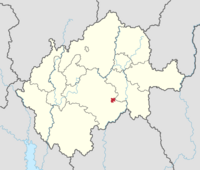
|
| Fleisshuk Special County | Fleisshukŕ Speciale Kres | — |  |
3 (Olmón Region) | ~4,700 | 1 January 2010 | 17 March 2011 | 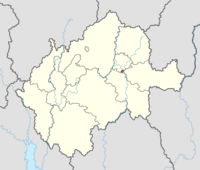
|
| Rósbrod Special County | Rósbrodŕ Speciale Kres | — |  |
15 (Bítënberk Region) | ~13,700 | 1 January 2013 | — | 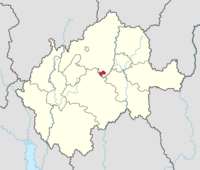
|
| Brassikov Special County | Brassikoviss Speciale Kres | — |  |
11 (Cízaren Region) | ~12,100 | 1 January 2017 | — | 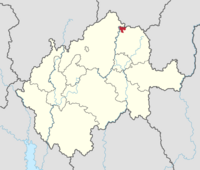
|
| Tonisbád Special County | Tonisbádŕ Speciale Kres | — |  |
17 (Ustokan Settlement Area) | ~13,500 | 1 January 2017 | 7 October 2018 | 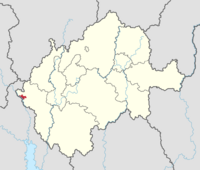
|
| Jóvóss Special County | Jóvóssŕ Speciale Kres | — |  |
13 (Lubov Region) | ~12,500 | 1 January 2019 | — | 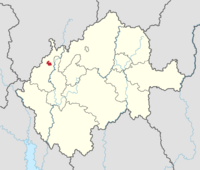
|
Existing counties
Graistrik
Graistrik Special County (Walnerian: Graistrikŕ Speciale Kres; Stedorian: Patädagrafän Grastränik) consists of 35 municipalities located in the Starbov Region and a single municipality from the Olmón Region. Established in on 1 January 2001, it serves as a local semi-autonomous administrative area for the Stedorian population in the area, especially enlarged by the Kugëlnachbáre. The county, while it is still subservient to the administration of their respective regions, has its own local elected assembly and its own administration. Its local representation is elected along with other regional elections. Its local institution includes:
- Graistrik Special County Council (Walnerian: Rát tes Graistrikŕes Speciales Kreses; Stedorian: Patädagrafänacäm Grastränik) - Council of 45 directly elected deputees, that make decisions in a specific field of local interests and is entrusted to enforce it
- Graistrik Special County Hóitman (Walnerian: Hóitman tes Graistrikŕes Speciales Kreses; Stedorian: Patädagrafänalecif Grastränik) - Representative figure of the county, akin to the national president, that has the right to parttake in the discussions in the National Assembly, even though he has no voting right
Drakotín
Drakotín Special County (Walnerian: Drakotínŕ Speciale Kres; Ustokan: Drakotínský Zvláštní okres; Upper Malenik: Drakotniski Wosebity wokrjes; Lower Malenik: Drakotniski Wósebne wobceŕk) consists of 31 municipalities located in the Ŕezënfeld Region and two municipalities from the Égënáŕ Region. Established on 1 January 2001, it serves as a local semi-autonomous administrative area for the Ustokans and Maleniks in the area of the Granite Mountains. The county, while it is still subservient to the administration of their respective regions, has its own local elected assembly and its own administration. Its local representation is elected along with other regional elections. Its local institution includes:
- Drakotín Special County Council (Walnerian: Rát tes Drakotínes Speciales Kreses; Ustokan: Drakotínský Zvláštní okresní sněm; Upper Malenik: Drakotniski Wosebity wokrjesny sejmik; Lower Malenik: Drakotniski Wósebne wobceŕkne pósejźenje) - Council of 45 directly elected deputees, that make decisions in a specific field of local interests and is entrusted to enforce it
- Drakotín Special County Hóitman (Walnerian: Hóitman tes Drakotínes Speciales Kreses; Ustokan: Hejtman Zvláštní okresní sněm; Upper Malenik: Hejtman Drakotniskeho Wosebiteho wokrjesa; Lower Malenik: Hawptman Wósebneho wobceŕkneho pósejźenja) - Representative figure of the county, akin to the national president, that has the right to parttake in the discussions in the National Assembly, even though he has no voting right
Tlucsná
Tlucsná Special County (Walnerian: Tlucsnáŕ Speciale Kres; Lower Malenik: Tlucsenski Wósebne wobceŕk) consists of 5 municipalities located in the Malenik Settlement Area. Established on 1 January 2001, it serves to coordinate the efforts and local administration in the Tlucsná enclave of the Malenik Settlement Area.
- Tlucsná Special County Council (Walnerian: Rát tes Tlucsnáŕ Speciales Kreses; Lower Malenik: Tlucsenske Wósebne wobceŕkne pósejźenje) - Council of 15 directly elected deputees, that make decisions in a specific field of local interests and is entrusted to enforce it
- Tlucsná Special County Hóitman (Walnerian: Hóitman tes Tlucsnáŕ Speciales Kreses; Lower Malenik: Hawptman Tlucsenskeho wobceŕkneho pósejźenja) - Representative figure of the county, akin to the national president, that has the right to parttake in the discussions in the Malenik National Council, even though he has no voting right
Solinec
Solinec Special County (Walnerian: Solincŕ Speciale Kres) consists of 17 municipalities located in the Cízaren Region. Established on 1 January 2009, it implores a type of Thransaltzer Acameralism, with a standing committee of 15 members and voting via newspapers (similar to Thransältzer Postillion). It uses a single organ:
- Standing Committee of the Solinec Special County (Walnerian: Stondrát tes Solinecŕ Speciales Kreses) is elected in sync with other regional assemblies, having a term of 4 years instead of 3 years of the State Council of Thransaltz.
Kossut
Kossut Special County (Walnerian: Kossutŕ Speciale Kres) consists of 12 municipalities located in the Ŕezënfeld Region.
Aisënec
Aisënec Special County (Walnerian: Aisëncŕ Speciale Kres) consists of 13 municipalities located in the Lómane Region.
Rósbrod
Rósbrod Special County (Walnerian: Rósbrodŕ Speciale Kres) consists of 15 municipalities located in the Bítënberk Region.
Brassikov
Brassikov Special County (Walnerian: Brassikoviss Speciale Kres) consists of 11 municipalities located in the Cízaren Region.
Jóvóss
Jóvóss Special County (Walnerian: Jóvóssŕ Speciale Kres) consists of 13 municipalities located in the Lubov Region.
Discontinued counties
TBA
